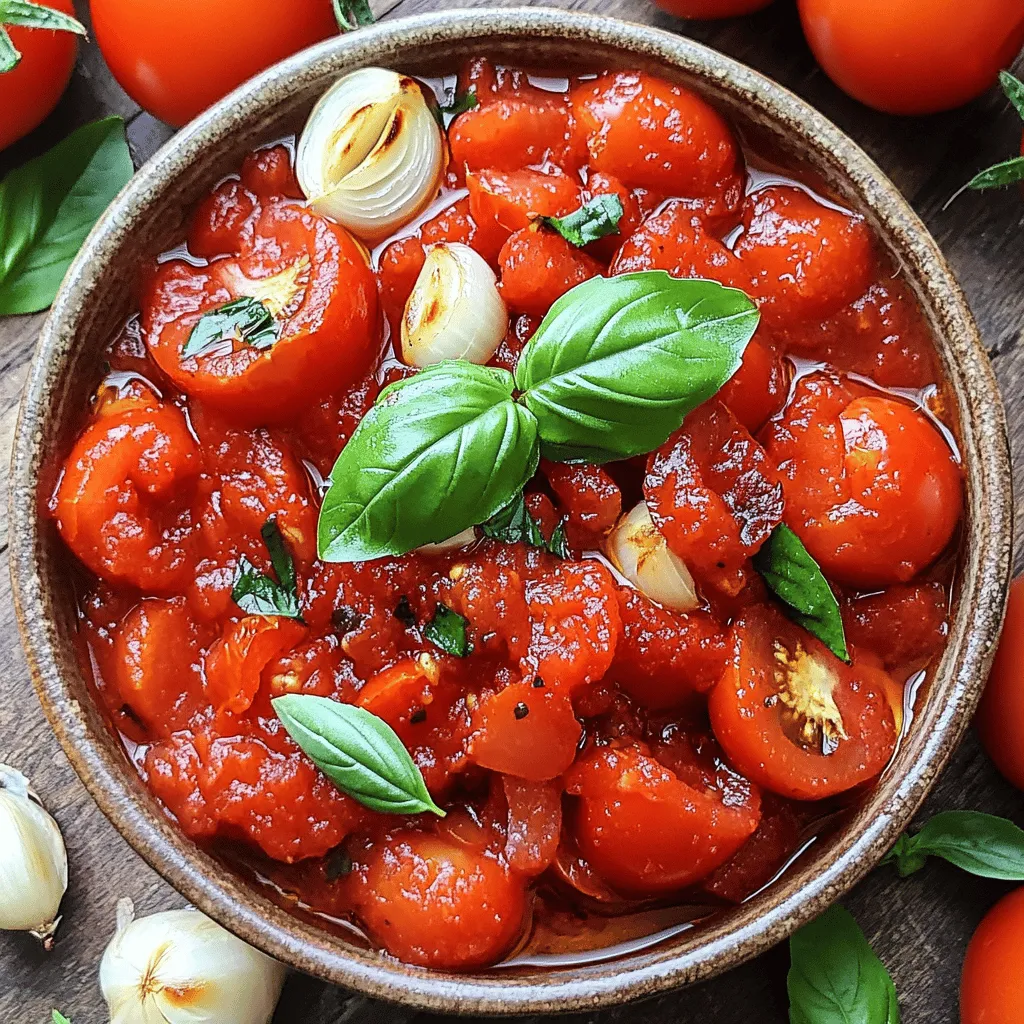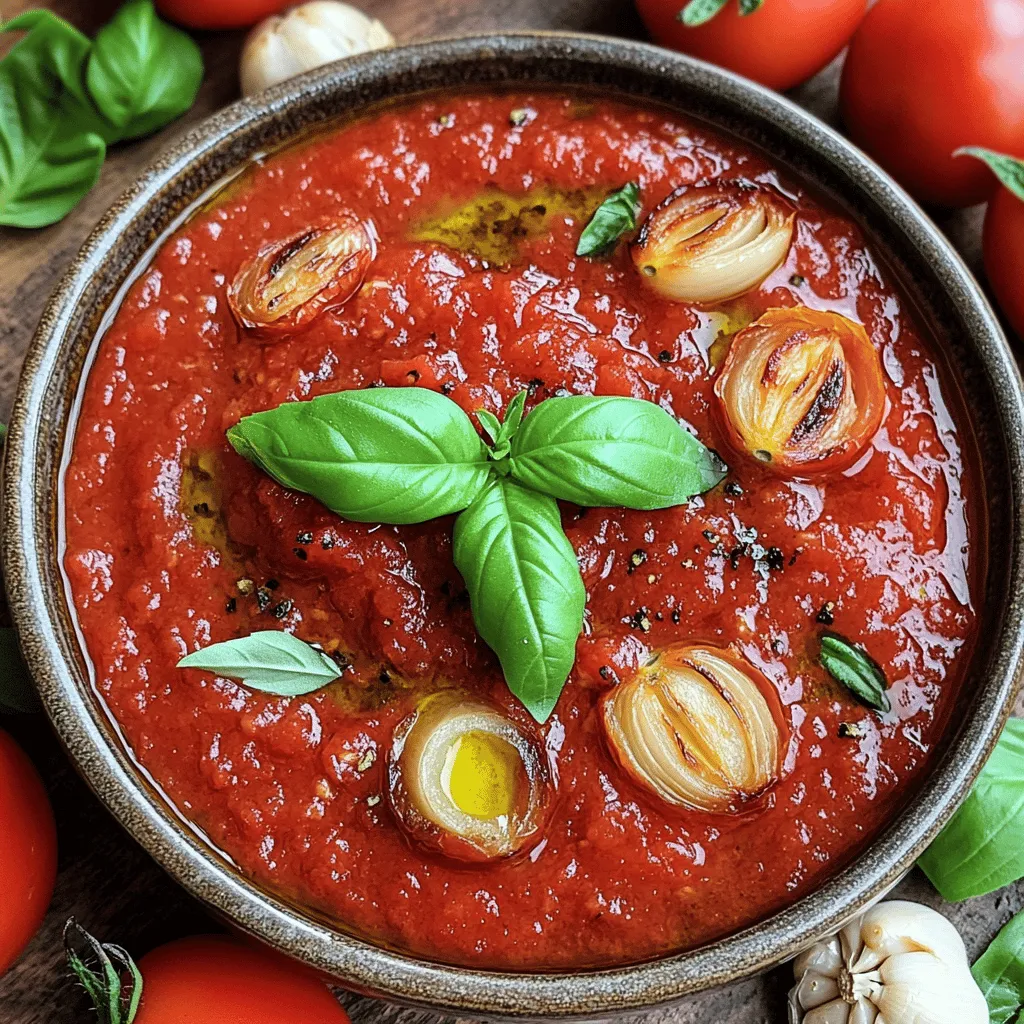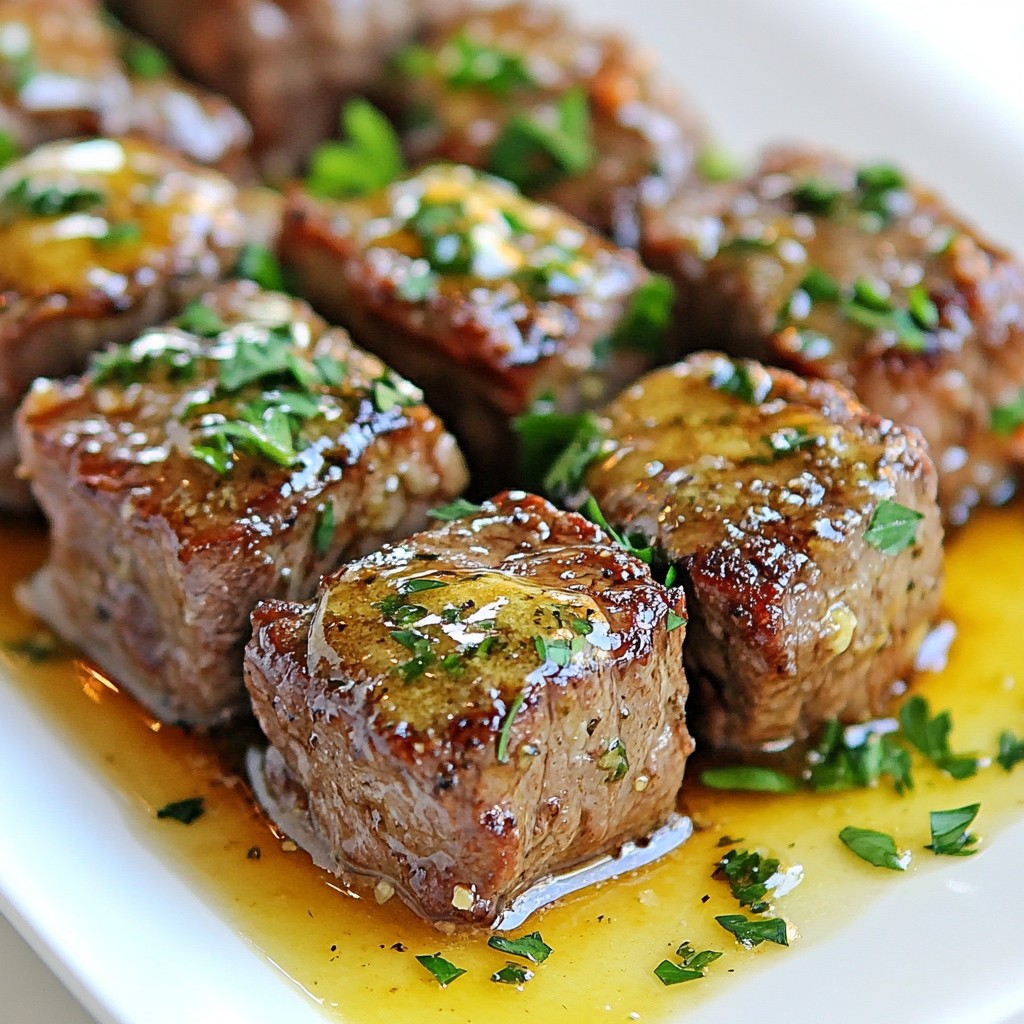If you want to elevate your cooking, try my Homemade Roasted Tomato Sauce. This easy recipe bursts with flavor and will impress anyone at your table. I’ll guide you through each step, from selecting ripe tomatoes to roasting them for the perfect taste. With simple tips and tricks, you’ll learn how to make a sauce that’s rich, fresh, and versatile. Let’s turn everyday meals into a culinary delight!
Ingredients
Essential Ingredients for Homemade Roasted Tomato Sauce
To make your own roasted tomato sauce, you need a few key items:
– 2 pounds ripe tomatoes (use Roma or beefsteak)
– 1 medium onion, quartered
– 4 cloves garlic, unpeeled
– 3 tablespoons olive oil
– 1 teaspoon sea salt
– ½ teaspoon black pepper
– 1 teaspoon dried oregano
– 1 tablespoon fresh basil, chopped (or 1 teaspoon dried basil)
– 1 tablespoon balsamic vinegar (optional, for added depth)
These ingredients work together to create a rich, flavorful sauce. The tomatoes are the stars of this dish, so choose the freshest ones you can find.
Recommendations for Selecting Ripe Tomatoes
When picking tomatoes, look for ones that are deep red and firm. They should feel heavy for their size. The skin should be smooth but not too shiny. Avoid tomatoes with bruises or soft spots. If you can smell the tomato’s sweet scent, it’s a good sign. Farmers’ markets often have the best selection.
Optional Add-ins for Enhanced Flavor
You can make your sauce even better with some optional add-ins. Consider adding:
– A pinch of red pepper flakes for heat
– A teaspoon of sugar to balance acidity
– Fresh herbs like thyme or parsley for extra aroma
– Carrots or bell peppers for sweetness
These add-ins let you adjust the flavor to your taste. Don’t be afraid to experiment!
Step-by-Step Instructions
Preparing the Tomatoes and Vegetables
Start by washing your tomatoes well. I prefer Roma or beefsteak tomatoes. They have a great taste. Cut them in half and place them cut side up on a baking sheet. Next, quarter the onion. Add it to the sheet along with the unpeeled garlic cloves. This mix gives a nice depth of flavor. Drizzle everything with olive oil, then sprinkle sea salt, black pepper, and dried oregano over the top. Toss gently to coat.
Roasting Process
Preheat your oven to 400°F (200°C). Once your oven is hot, place the baking sheet inside. Roast the veggies for about 35-40 minutes. You want the tomatoes to be soft and slightly caramelized. The smell will fill your kitchen, and it’s heavenly! When they are ready, take the sheet out and let it cool for a few minutes. After cooling, squeeze the roasted garlic out of its skins and throw the skins away.
Blending and Finalizing the Sauce
Now, it’s time to blend! Transfer the roasted tomatoes, onion, and garlic into a blender or food processor. If you like, add fresh basil and balsamic vinegar for extra flavor. Blend until smooth. If you prefer a chunky sauce, pulse the blender a few times. Taste the sauce and adjust the seasoning. You may want to add more salt or pepper. Finally, pour the sauce into a saucepan. Let it simmer on low heat for 10-15 minutes. This step enhances the flavor even more. You can serve your sauce in a rustic bowl. Drizzle with olive oil on top and garnish with fresh basil. Enjoy your homemade delight!
Tips & Tricks
Best Practices for Roasting Tomatoes
Roasting tomatoes brings out their sweet flavor. Use ripe tomatoes for the best taste. Roma or beefsteak are great choices. Cut them in half to help them roast evenly. Make sure to arrange them cut side up on the baking sheet. This helps the juices stay inside. Drizzle with olive oil and season well. Roasting at 400°F (200°C) makes them soft and caramelized. Keep an eye on them during roasting. They should take about 35 to 40 minutes.
Adjusting Flavor: Seasoning Suggestions
Taste your sauce after blending. You can adjust the flavor at this stage. If it needs more salt, add a pinch. A bit of black pepper can enhance the taste too. Dried oregano adds an earthy note. Fresh basil makes the sauce bright and fresh. For a deeper flavor, consider balsamic vinegar. It adds a nice richness. Always remember to start with small amounts and taste as you go.
Serving Suggestions and Pairing Ideas
This sauce is great for many dishes. Use it over pasta for a simple meal. Spread it on pizza as a base for toppings. It also works well as a dipping sauce with breadsticks. For a fun twist, try it with grilled veggies. Serve it in a rustic bowl, drizzled with olive oil. Add fresh basil on top for a lovely finish. Your homemade roasted tomato sauce will impress everyone!

Variations
Incorporating Different Herbs and Spices
You can change the flavor of your roasted tomato sauce by adding herbs and spices. Basil and oregano are classic choices. You can also try using thyme or rosemary for a new taste. For a fresh pop, add parsley or cilantro. Spices like red pepper flakes can give your sauce a kick. Experiment with different combinations to find what you love!
Adding Heat: Spicy Tomato Sauce Options
If you like heat, add fresh chili peppers to your sauce. Jalapeños or serranos work well for a spicy kick. You can also use crushed red pepper flakes for a milder heat. Mix in some hot sauce for an extra zing. Remember to taste as you go to get the right level of spice for your palate.
Alternative Ingredients for Dietary Preferences
You can easily adjust this recipe for dietary needs. If you want a vegan option, use vegetable broth instead of chicken broth. For a low-sodium version, skip the added salt or use a salt substitute. If you’re gluten-free, enjoy this sauce over gluten-free pasta or use it in a dish that fits your diet. There are many ways to make this sauce work for you!
Storage Info
Proper Storage Techniques for Tomato Sauce
To store your homemade roasted tomato sauce, first let it cool completely. This step is key to avoid condensation, which can dilute the flavor. Use an airtight container made of glass or plastic. Fill the container, leaving some space at the top. This space helps if the sauce expands when frozen. Label the container with the date, so you know when you made it.
Freezing Homemade Roasted Tomato Sauce
Freezing is a great way to keep your sauce fresh. Pour the cooled sauce into freezer-safe bags or containers. If using bags, lay them flat to save space in your freezer. You can stack them once frozen. When ready to use, simply take out the amount you need. Let it thaw overnight in the fridge or use the microwave for quick thawing.
Shelf Life and Reheating Tips
Homemade roasted tomato sauce lasts about 4-5 days in the fridge. If frozen, it stays good for up to 6 months. To reheat, pour the sauce into a saucepan. Heat it on low, stirring often until hot. Add a splash of water or olive oil if it seems too thick. This sauce works well for many dishes, making it easy to enjoy your homemade creation again.
FAQs
How do I make roasted tomato sauce from scratch?
To make roasted tomato sauce from scratch, gather fresh ingredients. You need ripe tomatoes, onion, and garlic. Preheat your oven to 400°F (200°C). Halve the tomatoes and place them cut side up on a baking sheet. Add quartered onion and unpeeled garlic. Drizzle olive oil and season with salt, pepper, and oregano. Roast for 35-40 minutes, until soft. Blend the roasted veggies, add basil, and adjust seasonings. Simmer briefly to deepen the flavor.
Can I use canned tomatoes instead of fresh?
Yes, you can use canned tomatoes instead of fresh ones. Canned tomatoes can save time and give you a great taste. Choose whole or crushed tomatoes, preferably San Marzano for the best flavor. Drain excess liquid before blending to avoid a watery sauce. The cooking time may vary, but the end result will still be delicious.
What dishes can I use homemade roasted tomato sauce with?
Homemade roasted tomato sauce works well with many dishes. Here are some ideas:
– Pasta: Toss with your favorite noodles for a quick meal.
– Pizza: Spread on dough before adding toppings for a flavorful base.
– Dipping sauce: Serve with breadsticks or mozzarella sticks for a tasty snack.
– Soups: Use as a base for tomato soup or other veggie soups.
– Casseroles: Incorporate into baked dishes for added moisture and flavor.
Homemade roasted tomato sauce is rich in flavor and easy to make. We covered what ingredients to use and how to prepare them. The step-by-step guide explains roasting and blending for the best results. You can explore variations with herbs and spices, and I shared storage tips. Remember, making your own sauce is rewarding. It adds freshness to meals. Enjoy experimenting and creating your unique recipes. Keep these tips handy for a tasty homemade touch to your dishes. Your kitchen will thank you!




